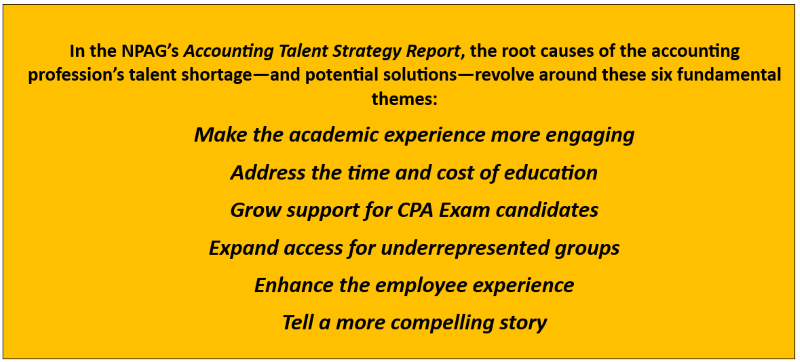Jennifer Wilson, from the National Pipeline Advisory Group, discusses why the accounting profession needs to “tell a better story” in order to address its chronic talent shortage
It’s no secret that the accounting profession is facing a talent shortage with many factors contributing to this problem, including higher education costs, pay competition from other sectors, a reputation for long hours, demographic shifts, work culture, inconsistent student engagement, certification hurdles, and more.
Despite a general awareness of the issue, however, the accounting profession has yet to devise a comprehensive strategy for addressing its talent woes.
To tackle this issue, the American Institute of Certified Public Accountants (AICPA) Council passed a resolution in May 2023 calling for a National Pipeline Advisory Group (NPAG) to use a data-driven and transparent approach to identify the core dynamics that are fueling the accounting profession’s talent shortage and recommend constructive solutions. NPAG was formed with 22 independent stakeholders, representing all facets of the accounting profession — public accounting firms of all sizes, corporate finance departments, academics, regulators, and industry associations.
After a year of intensive meetings and research, the NPAG issued a draft report on its findings in May 2024 and, after weeks of public comment, published its final report, Accounting Talent Strategy Report, on July 31.
Jennifer Wilson — co-founder and partner of ConvergenceCoaching, and named by CPA Practice Advisor in 2024 as one of the most powerful women in accounting — acted as the NPAG’s independent facilitator. We spoke with Wilson to learn the progress of this project and where it’s going now.

Thomson Reuters Institute: How did you get involved with the National Pipeline project, and what were the project’s initial goals?
Jennifer Wilson: The AICPA resolution that created NPAG also called for a very data-driven, inclusive study of the pipeline issues in our profession, and that a plan be built to develop strategies to address the issues. The goal was to bring together a whole bunch of people from different mindsets and backgrounds to study this issue and then create solutions in the form of a strategic plan. I was then asked to become the independent facilitator for NPAG.
Thomson Reuters Institute: How did the process for creating the NPAG unfold?
Jennifer Wilson: The 22 people in the advisory group were volunteers, and they gave us an unbelievable amount of time. We met six or seven times in two-day, in-person meetings, and met over video for two hours every month. We also had working groups meeting regularly, we reviewed almost 30 research reports around the talent pipeline and generated some of our own data through focus groups, feedback sessions, and a profession-wide survey in 2024. There was really an unbelievable outpouring of energy and interest in solving this problem.
Thomson Reuters Institute: Can you talk about what you learned during this process, and what came out of the report?
Jennifer Wilson: Before talking about the report, I just want to give the data some context, because one of the things we had to do was check our biases and entrenched thinking at the door. We all came from different perspectives, and we had to represent those perspectives, but we also had to let go of already knowing — or thinking we knew — what the root cause is of these talent issues, and we had to let go of our opinions about how to solve it.
Thomson Reuters Institute: Did letting go of that “already knowing” lead to any deeper insights?
Jennifer Wilson: One really big aha moment I had early on was that we — everybody — were looking for somebody else to be responsible for causing and solving the problem, whether it was accounting firms, academics, professional associations, regulators, employers, or whomever. So, we had to drop way of thinking – “This is someone else’s problem” — and learn anew what the true causes of it are. And what we realized is that no single entity is going to solve it. Rather, the solution will come through a unified effort across these associations and organizations.
We need to work better together and prioritize together as a profession to implement institutional energy — energy that I’d love to see pulled together to work on solutions.
We also realized that we don’t have to wait for any individual organization or association to begin implementing solutions to the pipeline shortage. Instead, we all can individually make changes and take actions to make our profession more attractive and to retain top people within it.
Thomson Reuters Institute: How did you go about identifying the root causes of the talent shortage, and did you learn anything you didn’t already know in the process?
Jennifer Wilson: We studied nearly 30 independent research studies from a range of sources, many of which are listed on the NPAG website. As a group, we read and summarized these studies, looking for common themes among them. Six themes that did emerge are outlined in the executive summary and the final report — and are the themes that we feel need to be addressed. These are the root causes of the tax & accounting industry’s talent shortage, and our proposed solutions are organized around these six themes.

Thomson Reuters Institute: Are the themes identified in the report arranged in any particular order? Are some more important than others?
Jennifer Wilson: No, we didn’t present the themes in any particular order of importance — they’re all equally important. The other thing we noted is that you can’t address them in isolation, and that’s bad news, because we’ve got to get to work in all areas in order for any meaningful change to happen. We have to change in all six theme areas, not just one or two, because they all affect different parts of the pipeline.
Thomson Reuters Institute: So, you’re saying that the talent shortage is really a systemic issue, one that affects — and is influenced by — all aspects of the profession?
Jennifer Wilson: When we started, I kept seeing this visual of the talent pipeline being like a PVC pipe with a few holes in it. What we discovered, however, was that the talent pipeline is more like a colander with a lot of holes, and they’re in a lot of different places. We don’t have to plug them all, but we have to plug more than one or a few.
Thomson Reuters Institute: Can you offer an example of how one or more of these holes might be plugged?
Jennifer Wilson: Okay, for example, take the last theme listed, “Tell a more compelling story.” We can tell a better story right now, because the story we tell about the profession is really a mostly negative story. Many, many people when they talk about their work in this profession do so in the negative. They talk about how hard the work is, how technical it is, how difficult it is to keep up with standards, how many hours they work, and how rough their peak period or busy season is.
We make ourselves sound like we’re a victim of the work rather than focusing on how cool this profession is, the difference we can make for others, and how critical that is to the success of the global economy.
I like to say that accounting professionals are the guardians of the global economy, and that we have a major-league important role in assuring the world’s markets. We help individuals achieve financial wellness, and we help entrepreneurial businesses think strategically, understand where they are, and what they can do to perform better.
We fuel America’s business, and that is fun and interesting. It’s also a tech-forward profession. We have a profession full of really top-quality people — good-hearted people, community-service-minded people, givers. There are so many cool things about this profession we could list right now that are 100% true, but nobody’s emphasizing them — so we have to tell a better story.
This is the first in a series of three blog posts about the National Pipeline Advisory Group (NPAG) and how to address the talent shortage in the tax & accounting industry







